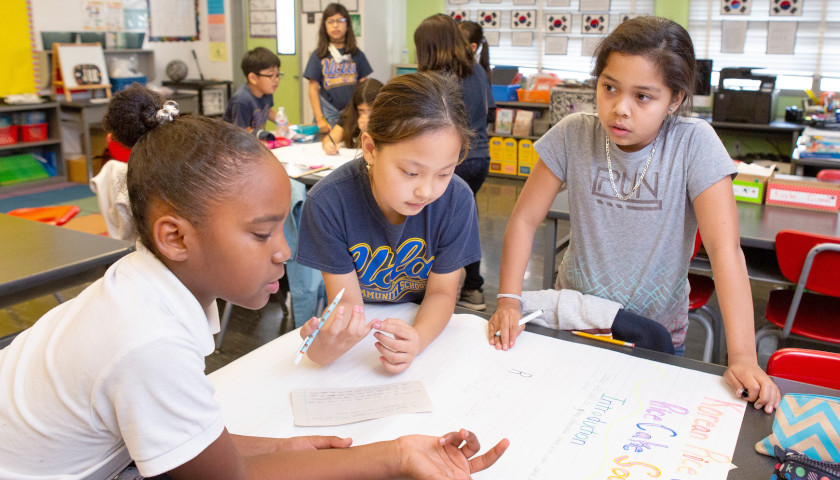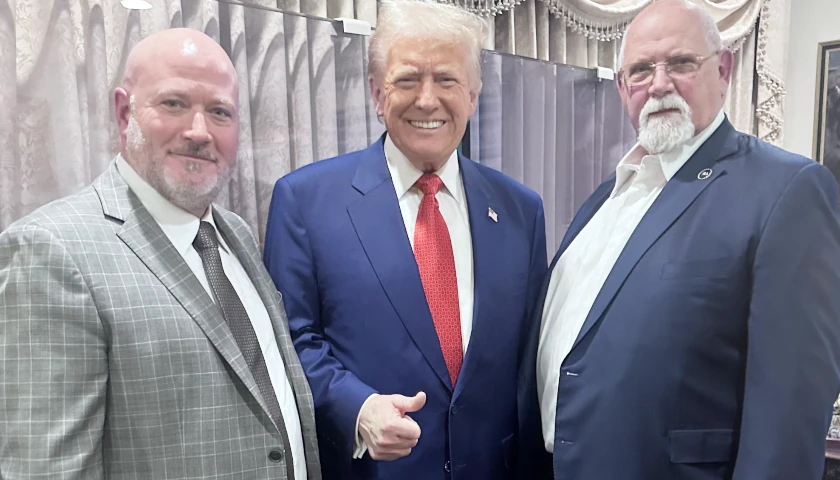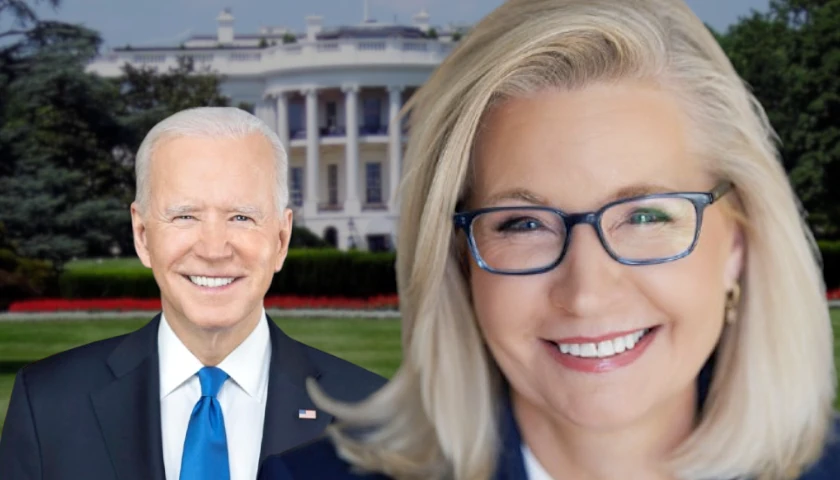by Larry Sand
According to the latest ABCs of School Choice – EdChoice’s comprehensive report about all matters pertaining to education freedom – policymakers in 40 states have debated 111 educational choice bills in 2023, 79 percent of which related to education savings accounts. (ESAs allow parents to receive a deposit of public funds into a government-authorized savings account with restricted, but multiple uses. Those funds can cover private school tuition and fees, online learning programs, private tutoring, community college costs, higher education expenses, and other approved customized learning services and materials).
The report continues, “As the months ticked by, a total of seven states enacted new choice programs and ten expanded ones already in operation. As of this writing, eight states have joined Arizona and West Virginia in offering all students choice, making 2023 the Year of Universal Choice.”
Overall, 32 states, the District of Columbia, and Puerto Rico have some form of private school choice programs, with 80 programs impacting about 800,000 students nationwide.
The teachers’ unions and their fellow travelers are fuming over the turn of events. One of the grinches’ ongoing claims is that any privatization measure hurts traditional public schools. However, when researcher Greg Forster looked at 34 studies on the effects of school choice on government-run schools, he found that in 32, school choice improves academic outcomes in public schools affected by the program, while one saw no visible difference, and just one found a negative impact.
Yes, competition works.
This sudden success of school choice reflects Americans’ growing dissatisfaction with public education, which has slowly eroded over the last two decades. During the pandemic, things were especially bad, as student test scores in math and English plummeted as a result of the forced shutdowns and ineffective remote learning, with satisfaction dropping sharply from a majority before COVID to a mere 42%, according to a 2022 Gallup poll.
Another criticism from the teachers’ unions and other members of the education establishment is that rural areas especially are devastated by school choice measures. But in reality, rural families benefit from school choice like everyone else. When parents are given a choice, new private education providers emerge to meet demand.
Florida is a good case in point. Ron Matus, Director of Policy and Public Affairs at Step Up For Students, explains, “Rural families in Florida are getting the best of both worlds. The overwhelming majority still choose traditional public schools, which in many cases have ably helped anchor rural communities. (Sixteen of the 30 rural districts earned A or B grades from the state this year; the rest earned Cs.) At the same time, families who need something different are able to access it.”
Tennessee is on deck. Gov. Bill Lee is trying to pass a universal choice bill, but the education establishment is in an uproar, throwing out all the usual anti-choice bromides. Steve Starnes, director of Greeneville City Schools, claims that a strong public education system is the “cornerstone of the United States.”
He asserts that the Greeneville City Schools Board of Education unanimously approved a resolution opposing vouchers. “In a nutshell, I guess you would say is, we are opposed to any form of vouchers. We believe that public funds should be sent to public schools. The board is very adamant, again, just like I’ve stated, that they feel that public dollars should go to public schools.”
Needless to say, choicers are not always successful in their quest for educational freedom. In Illinois, the state’s modest scholarship program was recently killed by Democrats in the state legislature. With a big assist from the Chicago Teachers Union and the National Education Association, 9,600 low-income kids who tried to escape from their traditional public schools are being forced back into them. And, of course, the 20,000 plus on the waiting list now have no hope of a better educational experience. It’s important to note that Illinois is the first state to kill an established choice program.
Using a load of left-wing babble, the Chicago Teachers Union was oh-so-pleased with the turn of events. A press release from the union declares, “The dedicated efforts of organizers and advocates made this triumph for public education possible, marking a significant milestone in the fight for anti-racist, gender affirming, pro-immigrant, equitable and fully funded public schools.”
Public schools are anti-racist?
In Chicago, minorities are especially poorly educated, with 11% of Black and 17% of Hispanic students reading at grade level. Hence, not surprisingly, 66% of parents support school choice in the Windy City. Also, according to the most recent data, 39% of public school teachers in Chicago enroll their own children in private schools, more than three times the national average.
On a national level, support for ESAs is decisive among Black parents, with 70.3% in favor of the program.
And it’s not only the Democrats who are blocking choice. In Texas, a rare red state with no private choice programs, Republican Gov. Greg Abbott’s universal ESA bill was essentially denied by Republicans. As John Tillman notes, “Twenty-four Republicans in the Texas House voted against education freedom in April. Twenty-two of them are the recipients of teachers union cash, and 11 have received more than $10,000.”
Tillman adds that Mississippi, Alabama, and Georgia are facing a similar problem with bought-off Republicans.
Now, litigation also is being used to stifle choice. In Wisconsin, a lawsuit filed with the Wisconsin Supreme Court seeks to block taxpayer funding for private school choice programs. The litigants are awaiting word from the state Supreme Court on whether it will take their case. They want the court to end the program, arguing it “violates the state constitution,” saying the legislature “has created a cancer that’s killing public schools.”
Countering the lawsuit, private schools, parents with students who attend them, advocacy groups, and the state chamber of commerce argue in court filings that “the 32-year-old program has benefitted families for a generation and the effort to undo it is politically motivated, after the Supreme Court’s majority shifted to liberal control earlier this year.”
Ultimately, we need universal school choice. Granted, some states – for political reasons – need to do it incrementally and then build to a position where every family – rich or poor – has a choice where to send their kids to school, letting the tax dollars follow the child.
In fact, school voucher programs are quite common in the rest of the economically developed world. Twenty-five Organisation for Economic Co-operation and Development (OECD) countries, a group of mostly wealthy nations, have vouchers or tuition tax credits for students to attend private schools of their choosing.
In 1995, Apple founder Steve Jobs said, “I remember seeing a bumper sticker when the telephone company was all one…and it said ‘We don’t care. We don’t have to.’ And that’s what a monopoly is. That’s what IBM was in their day. And that’s certainly what the public school system is. They don’t have to care.”
Jobs is right. Monopolies don’t work. Thankfully many states and parents are realizing that the monopolistic public schools “don’t have to care,” and are desperately trying to get a better education experience for their children.
– – –
Larry Sand, a retired 28-year classroom teacher, is the president of the non-profit California Teachers Empowerment Network – a non-partisan, non-political group dedicated to providing teachers and the general public with reliable and balanced information about professional affiliations and positions on educational issues. The views presented here are strictly his own.
Photo “Students Learning” by Alliance for Excellent Education. CC BY-NC 2.0.








